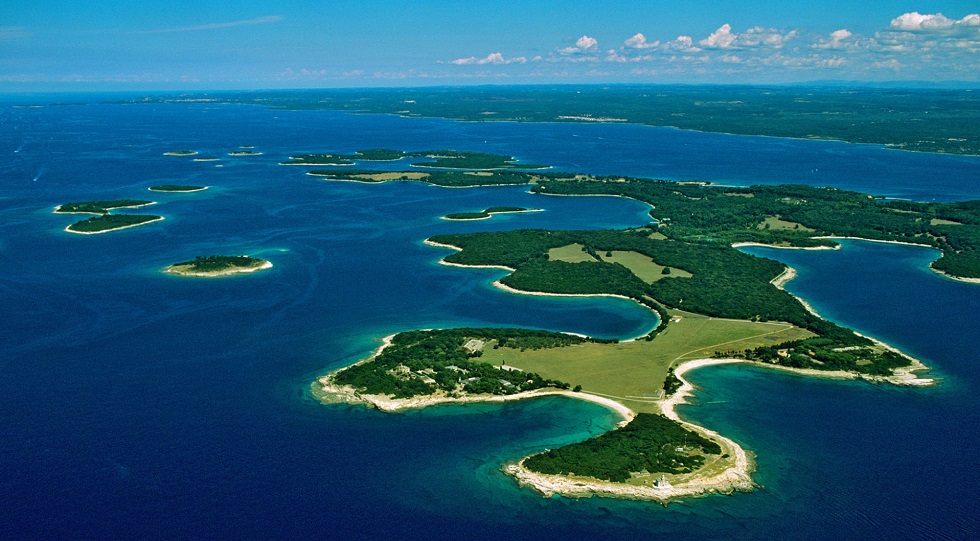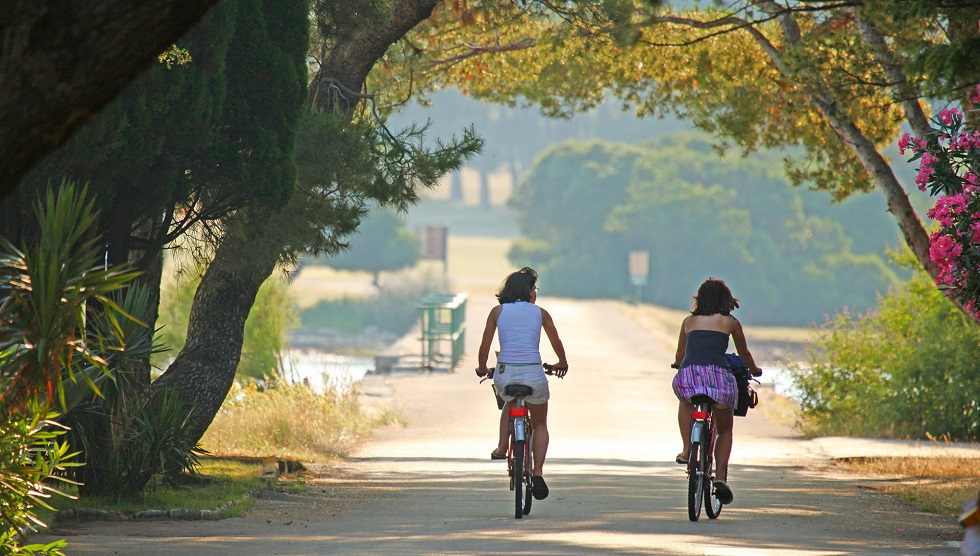Brijuni Islands National Park: Tito's Former Summer Residence Gets Upgrade
The Brijuni islands, once the private summer residence for Josip Broz Tito, longtime president of former Yugoslavia, is getting a long-awaited renovation. A new catamaran will allow access to both islands for the first time and dormitories are being updated for education and research projects.
According to Barbara Ban/Novac/Jutarnji List on December 29,2019; Tito’s legendary cinema is also getting a facelift and tourist facilities are undergoing upgrades. Those upgrades include a new information center and an updated Natural History Exhibition. Trains will allow tourists with disabilities to see all of Veliki Brijun, the larger of the two islands.
Recently, a contract to build an aluminum catamaran for the Brijuni islands was signed at Tehnomont Shipyard in Pula. It is a 15.5 million HRK (2.1 million EUR) investment, and this ship will be able to transport visitors to Mali Brijun, the smaller of the two islands, for the first time. Sveti Nikola Bay on Mali Brijun has a jetty dating back to the Austro-Hungarian Empire, which was so shallow that the previous excursion boat couldn’t dock there. Therefore, Mali Brijun has been largely neglected, since visitors could only reach it as part of an organized group and smaller boat. On Mali Brijun they could see a performance at the Ulysses Theater. This will be now be possible on a regular basis, and the ship should be finished in 18 months, which means that the Brijuni islands will offer more tourism opportunities when the 2021 season begins.
Ulysses Theater on Mali Brijun
Biggest Brijuni Islands Investment in Over a Decade
But this is only a part of a larger plan, and the largest investment on the Brijuni islands in the last decade, and beyond. It’s worth pointing out that billions are not involved, considering that big numbers are often mentioned when it comes to investing in these interesting islands. Recall that not long ago there was a plan to completely renovate the hotels and villas and add facilities and accommodations. It would have been a 250 million EUR investment, and the names of well-known worldwide luxury chains were being mentioned to run these hotels and attract the elite back to the islands, as they had done back in the 1920s and 1930s. Very little remains of that elite past and the islands still await the government’s next move. But governments and ministers with big plans have changed as the years have passed. Now the future of the Brijuni islands is no longer on hold.
In any case, opportunities to finance projects are being taken advantage of wherever they arise, and one of those is the Novo ruho Brijuna (New Brijuni Outfit) project which is worth 41 million HRK (5.5 million EUR). This project is being funded by the European Regional Development Fund. Ten percent of the funding is coming from the Environmental and Energy Efficiency Fund, and the rest from public institutions. This is a small sum when compared to more ambitious investment proposals, but it is noteworthy and will provide more tourism opportunities for the only national park on the Istrian peninsula. Finally, Mali Brijun will be available to a wider group of visitors, and that’s where the largest construction project is being planned.

Dormitories Renovated for Research and Education
“We plan to renovate seven facilities next year. These are former military dormitories at Sveti Nikola Bay. They will be updated and returned to their original use. The dormitories won’t house the military, but are intended for nature schools, for scientists, divers, researchers and even artists. Therefore, the purpose of these dormitories is to serve these groups who conduct their summer activities at the island. The updated dormitories will have about 70 rooms with bunk beds. They will be simple buildings with sanitary facilities. Some rooms will have their own bathrooms, and some will be equipped with common bathrooms,” says Masa Mihelić, who runs this European project on Brijuni National Park, and hopes that after this project there will be many others which will increase the tourist capacity on the island.
She also points out that the kitchens will be arranged among the seven facilities to serve guests’ needs. One kitchen will be used at the information center and another will be for other facilities, such as laundry and storage. Mihelić emphasizes that these new accommodations in Brijuni are not intended for the typical commercial tourist who might otherwise visit Veliki Brijun.
“We are placing emphasis on the educational research and cultural importance of this project. Larger groups will always be accommodated here, so the facilities cannot be used for individual purposes,” she explains.
Most of these facilities are not being used now and are in rather poor condition. One facility currently has a janitor, and another stores firefighter equipment. These investments will make this section of the national park come back to life. However, although construction has already begun and was expected to be finished by the start of this season; it has not gone as smoothly as planned, unfortunately. The completion of project had to be extended to 2021, Mihelić points out.

Mali Brijun Project Completion Postponed to 2021
“The project should have been completed by April 2020, but this will not be possible because of unforeseen circumstances. The pier on Mali Brijun collapsed and needed to be repaired. That became a multi-million EUR project, and our institution had to focus all its resources to address this issue. The rehabilitation of the facilities can begin only after this construction is completed,” Mihelić explains.
Their most significant accomplishment was choosing a contractor for the 150-passenger boat. One hundred of those seats will be inside the boat and accessible to people with disabilities.
New Catamaran Will Access Both Islands
“This boat will allow us to reach Veliki Brijun and Mali Brijun from Fažana. At the same time, the ship’s route will connect both islands. Then we will be able to organize a full day trip to Veliki and Mali Brijun. There will also be an option to go directly to Mali Brijun. Presently, it is only possible to visit that island as part of a special tour, but those had to be booked with advance notice and smaller groups. Special transport had to be used, which is why the trip was so expensive. This project will open the island to the general public and make the trip available to a wider audience,” points out Mihelić, who is the head of the largest EU project ever conducted on the Brijuni islands.
Veliki Brijun Renovation on Schedule
But no matter how far that project has fallen behind schedule, the rest of the renovation is being carried out according to plan. Therefore, by the end of this season, an information center had already been set up in Veliki Brijun, with an interactive screen presenting all the islands’ attractions. Two modern trains were purchased to transport tourists, and these allow people in wheelchairs to sightsee the island for the first time. The well-known Natural History Exhibition has been modernized and several new acquisitions are underway, as this is a complex project which will provide numerous new educational and tourist facilities. Tito's Summer Cinema will also get a new face.
Tito’s Cinema Gets Facelift
“It is a legendary cinema where Tito watched all the films which came to the Pula Film Festival, before their official screening. This space will be able to be used by cultural anthropologists when it is renovated and will feature long and short films on nature. So far, we have purchased 300 video clips from the archives of the former (Yugoslav) state in Belgrade which show the Brijuni islands from the 1950s to the 1980s. All of these films will be shown at the summer cinema,” the project manager points out.
Elizabeth Taylor and Richard Burton visit Tito on Brijuni Islands
And that's not everything. As part of the trip, the Brijuni islands will offer more than just a train ride and a visit to a safari park. That's why they are also designing 11 new attractions including promenades, stone stories, and educational trails.
For more information on tourist destinations and developments in Croatia, follow our Travel page. Check out the Brijuni Islands National Park website here, YouTube page here, and Instagram page here for more information and reservations.
2014 Best Croatian Promotional Film | Zagreb TourFilm Festival | Croatia
The Guardian Chooses 10 of the Best Small Islands in Croatia
The Guardian’s Kathryn Tomasetti chooses the 10 best small islands in Croatia.
Megaproject in Istria Worth 1.5 Billion Kuna on Brink of Collapse
Why did plans fail, despite the interest of powerful investors?

